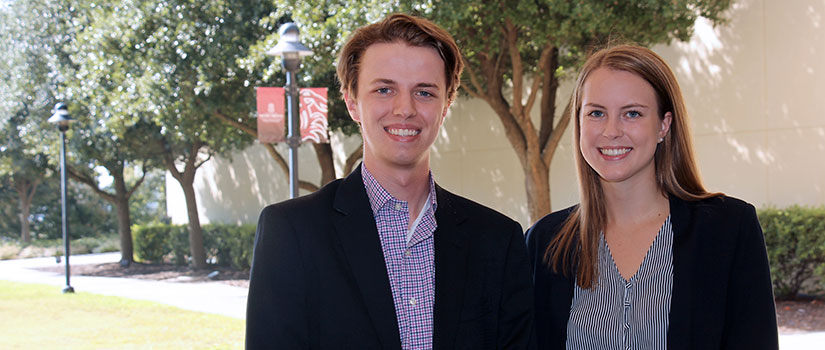By Allen Wallace, awallace@sc.edu
Posted on October 4, 2019
At the University of South Carolina, learning is never limited to the four walls of a classroom, the Columbia campus, or even to the United States. Programs like the Magellan Scholar Award help make it possible for Gamecocks to go anywhere in the world to pursue knowledge and build the foundation for great careers.
Morgan Bueter and David Brake, both sport and entertainment management majors at South Carolina, were selected as UofSC Magellan Scholars and have had the opportunity to conduct research in their field while experiencing some of the world’s greatest sights and cultural events.
“I have always been interested in conducting research during my time at South Carolina, but I wasn’t sure what it would look like for me. I was also interested in studying abroad and realized the Magellan grant could potentially give me the opportunity to pursue both interests at the same time,” says Magellan Scholar Morgan Bueter. “The process of applying was lengthy and definitely a challenge. However, I was fortunate to be surrounded by wonderful faculty like Dr. John Grady and Dr. Stephen Shapiro who helped me refine my research goals and develop a successful grant proposal.”
Bueter’s interest in sponsorship conflict, a common occurrence in professional sports, took her to Torino, Italy. She focused her research on the clash between professional soccer player Cristiano Ronaldo, a Nike sponsored athlete, and his club, Juventus, which is sponsored by Adidas.
“I knew Ronaldo’s global stature and influence would make for a very unique and interesting study,” she says. “The best part of the experience was without a doubt attending the matches. Italian soccer fans are like nothing I have ever witnessed before, and it was quite the experience to say the least.”
The chance to explore and experience a different culture is one of the greatest benefits for Magellan Scholars like Bueter and David Brake, who spent more than three months at Deakin University in Australia. Brake researched environmentally sustainable practices of major sporting venues in Australia and compared them to venue management practices in the United States.
Brake chose sustainability for his research because he sees it as one of the most important issues people are dealing with today and believes the sport industry should do more to raise awareness and reduce environmental footprints. He hopes to apply the knowledge from his research into his career to make positive changes wherever he goes. His time in Australia reinforced that passion.
“The best part of my entire experience in Australia was being able to explore and travel within Melbourne and the entire region,” Brake says. “I was able to visit the Great Barrier Reef, Sydney, the Great Ocean Road, and New Zealand. Going to these amazing places has given me an even greater perspective on how beautiful the world is, which has made my research even more relevant to me during a time when the some of the greatest natural wonders on the planet are at risk because of human consumption and pollution.”
Magellan Scholars work in collaboration with a faculty mentor on a research project which can involve travel, and they receive up to $3,000 to help with the journey and the study.
Grady is a faculty member in the Department of Sport and Entertainment Management and has served as faculty mentor for nearly a dozen Magellan Scholars. In 2016 he and now-alumnus Anthony Carson traveled to the Rio Olympics to research the International Olympic Committee’s controversial Rule 40. They went on to present their findings at numerous industry and academic conferences, including a presentation at Harvard Law School.
"My first experience out of the country was going to the Olympics,” Carson says. “It was certainly a culture shock for me, but the experience was incredible and being able to tie it in to things through the university certainly made the experience worthwhile."
Grady and other HRSM faculty encourage students to explore international research opportunities, and when a student chooses to do so, the mentorship begins long before the Magellan award is won. Students have the support they need every step of the way, from experts who have been through it all before.
“This grant program at UofSC is unique in allowing undergraduates to be so immersed in research early on in their academic careers and often leads to pursuing research later on in graduate school,” Grady says.
Matt Brown, chair of the Department of Sport and Entertainment Management, says the faculty will continue making it a priority to assist interested students.
“The Magellan Scholars Award has made high-level research at international sporting events possible for several of our students,” Brown says. “They are fortunate to have excellent sport and entertainment management faculty mentors to help them through the application process and research process. In fact, Dr. Grady is one of the leading Magellan Scholar mentors on campus."
The Magellan Scholar Award is competitive, and the process of applying is not easy, but without exception, winners say it was well worth the effort.
“Absolutely go for it and to rely on the support of your professors – they want to help you succeed,” Bueter says. “My semester abroad pursuing research was the best four and a half months of my life, and I am infinitely grateful to my professors and family who supported me and helped make it happen!”
The fall deadline for Magellan Scholar Award applications is Oct. 23 at 5 p.m. More information is available online through the University of South Carolina Undergraduate Research Office.
Learn more about the Department of Sport and Entertainment Management.
